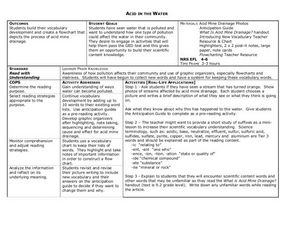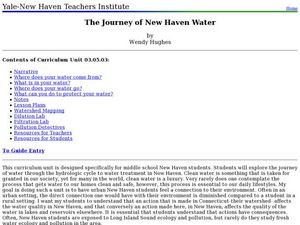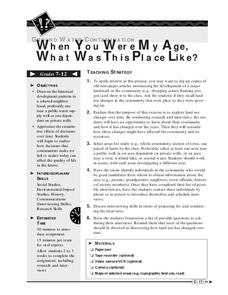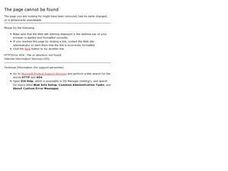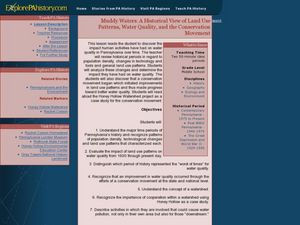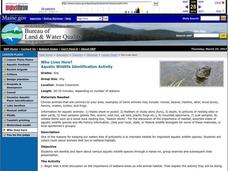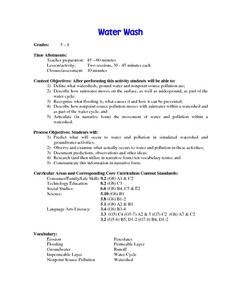Curated OER
Saving the Bay
Learners investigate water pollution prevention. In this ecology wastewater lesson, students activate prior knowledge about sewage, then view a video explaining the waste water sewage system used in the San Francisco Bay area. Learners...
Curated OER
What's in the Water?
Students examine how pollutants can affect ocean animals. In this pollution lesson, students read a story about the ocean floor, think about what would happen to the plants and animals if the ocean became dirty or polluted, and conduct...
Curated OER
Cause And Effects Of Pollutants In Ecosystems
Eighth graders define what an ecosystem is, what its make up is and how pollution effects it. In this air pollution lesson students identify the cause and effects of pollution on an ecosystem and trace a food chain.
Curated OER
Water Pollution and Food Chains
Students investigate the two key concepts covered in this lesson: first, how pollution can affect plants, and, second, how polluted plants affect the rest of the food cycle. In sum, this lesson teaches students about "Bioaccumulation".
Curated OER
Water Quality Survey
Students identify the differences in the water quality of a stream and complete water testing. In this water quality lesson students collect aquatic insects and identify them.
Curated OER
Air Pollution
Students research and find information on air pollution. In this air pollution lesson plan, students answer short answer questions about air pollution.
Curated OER
Water Quality Tests Explained
Students identify the eight tests done to check for water quality. In this ecology lesson, students explain why it's important to test water in rivers. They explore sources of river water pollution.
Curated OER
The Dirty Water Project
Students investigate different methods (aeration and filtering) for removing pollutants from water. They design and build their own water filters. Students identify the pollutants in a water sample using sight and smell, explore what...
Curated OER
What's Down the Well?
Students examine how environmental engineers determine possible sites for drinking water wells. They listen to a teacher led-lecture, and create their own groundwater well model using a coffee can and wire screening, observing how...
Curated OER
Pollution Prevention in Schools
Students review P2 concepts they learned in previous lessons and explore how to reduce the pollution in their school. They also examine ways to conserve energy.
Curated OER
Acid in the Water
Ninth graders learn about the effect pollution has on water and how this affects their community. In this environmental awareness lesson, 9th graders expand their vocabulary and create a flowchart that demonstrates the process of acid...
Curated OER
The Journey of New Haven Water
Students become familiar with the water cycle and water issues. In this water lesson students examine what they can do to protect their water.
Curated OER
When You Were My Age, What Was This Place Like?
Students discover how land use in their community has changed. In this community and ecology lesson, students scan old newspapers to find articles about the development of community land. Students discuss and predict how land use has...
Curated OER
Cleaning Water: How Filters Work
Students construct their own water filter to obtain clean water. In this filtration lesson, students produce tainted water in order to properly filter it with filtration devices made in class.
Curated OER
Testing Your Water
Students perform several water quality tests on groundwater from their area. They use test strips to determine the pH, hardness, alkalinity, nitrates, iron and chloride levels.
Curated OER
Preventing Water Pollution
Fourth graders write at least two ways to clean the water and two ways to prevent pollution with appropriate guesses, striving not to create any more pollution in the water. They understand how pollution affects water as well as the rest...
Curated OER
Water Pollution
Fifth graders examine what contaminated water looks like, and how it becomes polluted. They examine a teacher demonstration of water is not polluted but does contain rocks and other things that do need to be cleaned out before drinking...
Curated OER
Water Filtering
Young scholars investigate how polluted water is filtered so people can use this recycled resource. They conduct an experiment in which they put "polluted" water through a filtering system. They investigate what happens at a water...
Curated OER
Liquid Assets: Watershed
Pupils watch videos and create a representation of their watershed. In this water resources and pollution lesson plan, students watch three short videos and discuss them. They use ordinary objects to create a model of their watershed.
Curated OER
"Hard" Data from Space
Students use satellite images to analyze development patterns within Baltimore City. They prepare a land cover map for Baltimore indicating the prevalence of impervious surfaces and explore how these patterns affect water pollution.
Curated OER
Muddy Waters: A historical view of land use patterns, water quality, and the conservation movement
Students research the impact that human activity had on Pennsylvania's water supply over time. In this water quality lesson plan, students research, discuss, and write about how Pennsylvania's water quality has been affected and what...
Curated OER
Who Lives Here?
Young scholars identify various aquatic wildlife species. In this biology lesson students collect clues about animals that live in wetland habitats. Young scholars rotate through several stations displaying particular animal species to...
Sargent Art
Protect Our Marine Life
Encourage water conservation and boost art skills with a hands-on activity that challenges young painters to create a scene highlighting marine life. Using oil pastels, scholars draw an underwater scene and write a tip for viewers to...
Curated OER
Water Wash
Students define watersheds, ground water and nonpoint source pollution. They describe how rainwater moves on the surface, as well as underground, as part of the water cycle. They recognize what flooding is as well as its causes.












